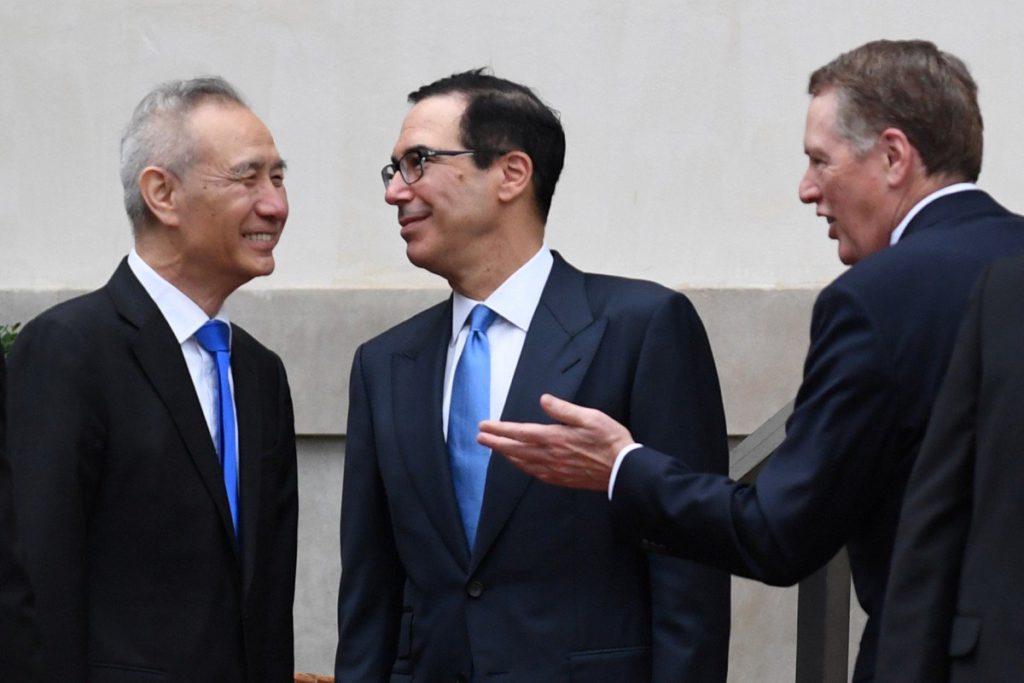No deal announced after US-China talks

Chinese Vice-Premier Liu He is greeted by US Treasury Secretary Steven Mnuchin (centre) and US Trade Representative Robert Lighthizer as he arrives for trade talks in Washington on Friday. Photo: Reuters
WASHINGTON D.C., May 10, 2019, SCMP. US Treasury Secretary Steven Mnuchin said negotiations had concluded for the day but still characterised them as constructive. Hanging over the talks were an additional increase in tariffs on Chinese goods, which took effect at 12:01am, reported the South China Morning Post.
Negotiations to end the US-China trade war came to a surprisingly early close in Washington on Friday with no signs of a deal – reportedly just hours before the Chinese delegation will return to Beijing.
US Treasury Secretary Steven Mnuchin told reporters at noon that the talks had been constructive as he left the US trade representative’s office, where negotiators held their latest round of talks in an attempt to end a months-long trade dispute. He said talks were finished for the day.
Hu Xijin, editor-in-chief of Chinese state media tabloid Global Times, said the delegation from Beijing was scheduled to leave the US on Friday afternoon.
A smiling Liu He, the Chinese vice-premier and lead negotiator, was greeted by Mnuchin and US Trade Representative Robert Lighthizer outside the USTR office on Friday morning, preceded by a Secret Service agent carrying two bulging shopping bags from a major American doughnut chain.
It likely took more than a sweet breakfast to cover the bitter taste left behind from the previous night’s events, however, with a substantial increase in tariffs on US$200 billion of Chinese goods having taken effect at 12:01am on US President Donald Trump’s orders.
Speaking to select Chinese language media outlets on Thursday evening, Liu said that “under the current circumstances, increasing tariffs is not a good way of resolving problems”. Beijing has vowed to respond to the increased tariffs with countermeasures, but has not yet indicated how it will do so.
The US Chamber of Commerce said in a statement shortly after the talks broke up on Friday that the group is “deeply concerned about recent suggestions that China is backing away from progress made to date”.
“The American business community urges the Administration and the Chinese government to move forward expeditiously and in good faith to strike a high-standard, comprehensive, enforceable agreement, and end the tariffs now in place,” according to the announcement by the chamber, which represents 3 million companies including Ford Motor Company and IBM.
“Prolonging trade tensions and the escalation of tariffs are in neither country’s interest,” it said.
During Thursday’s brief discussions, Lighthizer assured Liu that goods carried on US-bound cargo ships that had left Chinese ports before May 10 would not be subject to the increase in tariffs from 10 to 25 per cent, according to a source close to the negotiations.
While that means it will take several weeks for the US’ higher rates to take effect, the increase rattled markets around the world and stoked concerns in the business community about the damage that further escalation of the trade war could inflict on companies working between the two countries.
“Any substantive agreement must also include a plan of action as progress is made to reduce and ultimately remove the tariffs that both sides have imposed,” the US-China Business Council, a member organisation for US companies with operations in China, said in a statement on Friday morning.
Trump has pushed back against rising anxiety that the prospect of a deal, having once seemed within negotiators’ grasp, was slipping away, telling reporters Thursday that it was “possible” an agreement could be reached by the end of this week.
Yet in a salvo of early morning Tweets ahead of Friday’s talks, he said the US was in “no rush” to make a deal and repeated his willingness to continue taking in “massive payments” to the US Treasury in the form of tariffs.
Though he has claimed the bill for those taxes is footed by Chinese exporters, multiple studies have shown that it is largely US importers and – ultimately – consumers, that are burdened with the increase in costs.